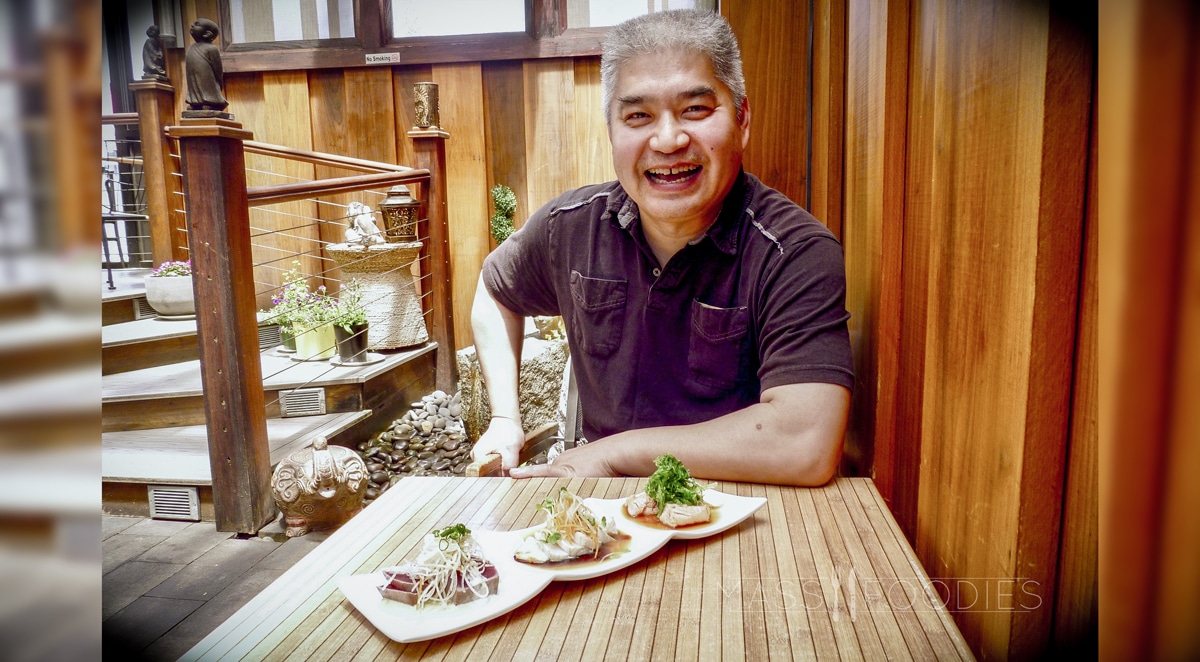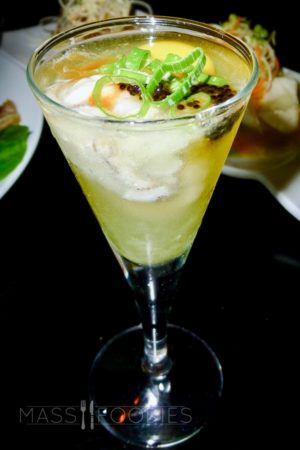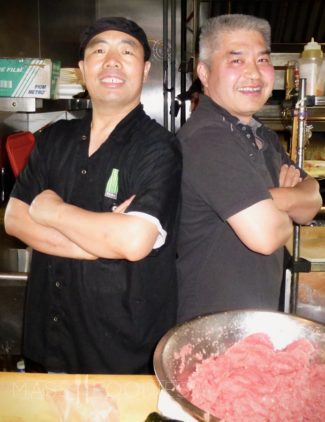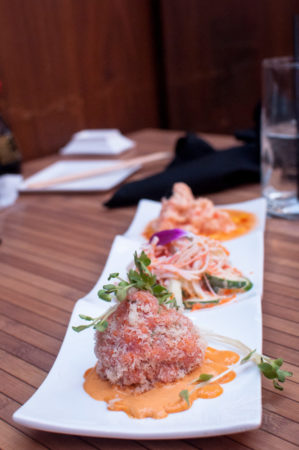
Exuberant (iɡˈzo͞ob(ə)rənt) adj: filled with or characterized by a lively energy and excitement. Synonyms: animated, ebullient, enthusiastic, cheerful, high-spirited, irrepressible, full of life, Wilson Wang.
Get Wilson Wang, owner of Baba Sushi (Worcester and Sturbridge) and hot-pot restaurant Chuan Shabu, talking – about anything but especially about food while food is on the table – and his exuberance is as deep as it is wide-ranging. No one I have met loves food and serving it more.

Fish? As everything from Wilson’s acclaimed oyster shooter to his tartaki trio of maguro (tuna), shiro maguro (white tuna), and sake (salmon) to an abundance of nigiri and rolls fill the table, he explains that he buys the best fish from seven different suppliers, discusses the differences between the types of fish available here, in China, and throughout Asia, and bemoans that he can’t sell his customers on jellyfish.
How he promised his wife “no more restaurants”? He chuckles: Did anyone think he would stop? He’s got at least two more in the works – one of which will fill a culinary void in Worcester. (More news soon!)
Children? He scrolls photos his daughter eating her way around Kyoto and the streets and restaurants of Japan – ramen, giant scallop, uni, curry, tofu skin – and laughs as he recalls teaching elementary school students how to make maki.
Japanese sushi masters? He reveres them, especially the legendary Jiro Ono, Japan’s three-Michelin-starred chef.
Knife skills? He pauses to demonstrate the way he was taught to hold a knife with his forefinger across the handle and up towards the blade to reduce the stress on his arm.
Food tricks? He recalls how a mentor of his cooked a Peking Duck in one day using a technique that pumps air inside the carcass so the skin and muscle separate and then pivots to explain how smoking salmon with a coffee bean, lemon, and tea leaves can give you seven days of smoky depth in just 20 minutes.
Sake? He pours it freely at the table – every time clinking his glass below yours in a show of respect before you drink until you really really shouldn’t think about even walking home. (Word of warning: Wilson once put away 3 PITCHERS – 300 shots – of sake his customers bought him in one evening while he was working the sushi bar. What’s the Asian expression for drinking like you have wooden leg while wielding an impossibly sharp knife?)

American eating habits? He delights with a breakdown of the differences between American and Asian cooking and eating habits and gives a precise breakdown of what he has learned since he came to this country in 1995 and opened his first Baba in 2007.
That last one consumes a lot of Wilson’s thoughts – and rightly so. Even today, Worcester is not known for its Asian cuisine. But opening a sushi restaurant in 2007 on Park Avenue between Rocco the Tailor store and what was then a run down convenience store? “The first months we were kind of quiet and then we won the Best Chef Competition.” Wilson recalls.
Wilson had the pedigree but was it ready for him to unleash what he learned working under Ting Yen at Oishii in Chestnut Hill and his training in China at the Zibo Chef School and Shandong University before he came to America in 1995? A Chinese guy serving Japanese food to a panel of all-American Worcester judges against 52 local chefs? Wilson didn’t play it safe. He served that shooter: raw oyster and quail egg floating in a shot of lemon juice, Japanese liquor, and Tabasco, and topped with black caviar. It’s fresh and alive and feels like Worcester today, not 2007. Sure he had been working in Worcester for a couple of years and knew his audience but still risky for sure.
“It was scary for me,” Wilson says. “All the good restaurants and chefs. All American judges from here. Will they like it? What do they understand? What have they seen before? Always the first bite for people is the challenge.”
That win in 2007 was followed others and countless accolades (both for himself and the restaurants) but the challenges continued.
“I was at Oishii for three years and then all over New England and New York,” Wilson recalls. “I learned different kinds of food and American culture. Sushi men from Japan know Japanese sushi culture. They don’t know the way of doing things here for American palates. Like a sushi roll is always seaweed outside not rice outside. In America, rice is always outside. Why? Rice on the outside is more material, more fish. Americans need more. Most of my sales are western style. You have to put a little bit of fried. I want people to get and try more things. But you have to throw to a bit of American culture.”
 Not that all people order is shrimp tempura, but the most popular rolls have a bit of fried crunch in them. There are other reasons for Wilson’s approach too: Worcester may have plenty of international students but not the international businessmen and tourists with deep pockets and understanding that pack high-end sushi places in other cities. Not to mention the fact that sushi making is deceptively difficult. It requires exceptional quality, handling, knife skills, and presentation. There is nowhere to hide for the chef. Which is why, Wilson explains, “sushi man” is a top ten job in Japan and meals there command $100 per person or more. The average in America is much lower, and while customers who have been with him for ten years say “just bring out stuff,” most are still on a learning curve. (The same was true with Chuan Shabu as his customers tried to understand hot pot. The two restaurants are combined in the Sturbridge Baba Sushi.)
Not that all people order is shrimp tempura, but the most popular rolls have a bit of fried crunch in them. There are other reasons for Wilson’s approach too: Worcester may have plenty of international students but not the international businessmen and tourists with deep pockets and understanding that pack high-end sushi places in other cities. Not to mention the fact that sushi making is deceptively difficult. It requires exceptional quality, handling, knife skills, and presentation. There is nowhere to hide for the chef. Which is why, Wilson explains, “sushi man” is a top ten job in Japan and meals there command $100 per person or more. The average in America is much lower, and while customers who have been with him for ten years say “just bring out stuff,” most are still on a learning curve. (The same was true with Chuan Shabu as his customers tried to understand hot pot. The two restaurants are combined in the Sturbridge Baba Sushi.)
Personally I believe if more people explored the joys of Baba’s barbecued hamachi collar or the way fatty tuna melts in your mouth or the unique creaminess of uni the world would be a better place – and Wilson would be even more exuberant (if that is even possible). But he gets the difficulty.
“It’s hard to understand raw tuna if you were raised with Charlie in a can,” Wilson says. “We always respect the customers but we also respect the cultures. Because where you grew up that’s what you have in your mind, and we need to focus on the local customers. We have very good traditional Japanese food but many won’t touch it. We have done beef liver, pork liver, kobe beef sushi. Some people love it. But I can’t make it every day because it won’t hold for more than 24 hours before color and quality go down.”
Yet none of this has dulled Wilson’s enthusiasm for doing and exploring more: He sees food here as wide open, which is one of the reasons he plans to add more restaurants. The other is his staff. He has chefs who have been with him for years. Tyler, the man in charge of the Baba kitchen, has been with Wilson from day one, many others for just as long. He wants to give them room to grow and afford them the opportunities this country gave him.
“I borrowed money to come to America,” Wilson says. “I was a student. I learned to find the thing you like and never ever give up. You’ll always be tired. You’ll always be frustrated. But if you are good enough people will be looking for you.”
But not if you skimp on quality, Wilson quickly adds: “Quality is always first, then presentation then speed, speed, speed. How can I keep moving Baba and all my restaurants up and up and up? Three ways: First quality, second quality, third quality. If I lose my quality then presentation and service, then our customers will leave. They don’t care who I am. People come here for the sushi and fish.”
And Wilson is still learning – as a businessman, a sushi man, and a local resident. He knows he doesn’t know everything and listens to everyone from Brian Treitman at BT’s Smokehouse (who taught him about the town of Sturbridge) to a little girl in an elementary school class who asked him if you can put chocolate in rice for a sweet rice dessert.
“Sweet rice!” Wilson cheers, extra exuberance filling his eyes. “I learn from her mouth. I learn from a ten-year-old girl. No Japanese sushi chef would make a desert roll. In America that is possible. It opens up your mind. It was natural for her to speak up. This is why I do this. You want the best for the public. Period.”
The Exuberant Mind of Baba Sushi’s Wilson Wang
Jim sat down with Baba Sushi Worcester/ Baba Sushi Sturbridge / Chuan Shabu owner, Wilson Wang to talk about a few of his sushi dishes… among other things! Full interview here: https://massfoodandwine.com/chefs/the-exuberant-mind-of-baba-sushis-wilson-wang/
Posted by Mass Foodies on Thursday, July 6, 2017
